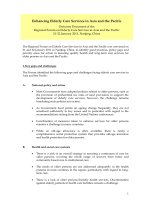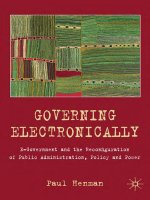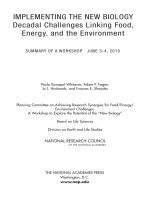British Government and the Constitution pptx
Bạn đang xem bản rút gọn của tài liệu. Xem và tải ngay bản đầy đủ của tài liệu tại đây (3.99 MB, 903 trang )
This page intentionally left blank
British Government and the Constitution
The first five editions of this well-established book were written by Colin
Turpin. This new edition has been prepared jointly by Colin Turpin and Adam
Tomkins. This edition sees a major restructuring of the material, as well as a
complete updating. New developments such as the Constitutional Reform Act
2005 and recent case law concerning the sovereignty of Parliament, the Human
Rights Act, counter-terrorism and protests against the Iraq War, among other
matters, are extracted and analysed. While it includes extensive material and
commentary on contemporary constitutional reform, Turpin and Tomkins is a
book that covers the historical traditions and the continuity of the British con-
stitution as well as the current tide of change. All the chapters contain detailed
suggestions for further reading. Designed principally for law students, the book
includes substantial extracts from parliamentary and other political sources, as
well as from legislation and case law. As such it is essential reading also for poli-
tics and government students. Much of the material has been reworked and
with its fresh design the book provides a detailed yet accessible account of the
British constitution at a fascinating moment in its ongoing development.
Colin Turpin is a Fellow of Clare College and Reader Emeritus in Public Law at
the University of Cambridge.
Adam Tomkins is the John Millar Professor of Public Law at the University of
Glasgow. His previous books include Public Law (2003), Our Republican
Constitution (2005) and European Union Law: Text and Materials (2006).The Law in Context Series
Editors William Twining (University College London) and
Christopher McCrudden (Lincoln College, Oxford)
Since 1970 the Law in Context series has been in the forefront of the movement to
broaden the study of law. It has been a vehicle for the publication of innovative scholarly
books that treat law and legal phenomena critically in their social, political and economic
contexts from a variety of perspectives. The series particularly aims to publish scholarly
legal writing that brings fresh perspectives to bear on new and existing areas of law
taught in universities. A contextual approach involves treating legal subjects broadly,
using materials from other social sciences, and from any other discipline that helps to
explain the operation in practice of the subject under discussion. It is hoped that this ori-
entation is at once more stimulating and more realistic than the bare exposition of legal
rules. The series includes original books that have a different emphasis from traditional
legal textbooks, while maintaining the same high standards of scholarship. They are
written primarily for undergraduate and graduate students of law and of other disci-
plines, but most also appeal to a wider readership. In the past, most books in the series
have focused on English law, but recent publications include books on European law,
globalisation, transnational legal processes and comparative law.
Books in the Series
Anderson, Schum & Twining: Analysis of Evidence
Ashworth: Sentencing and Criminal Justice
Barton & Douglas: Law and Parenthood
Beecher-Monas: Evaluating Scientific Evidence: An Interdisciplinary Framework for
Intellectual Due Process
Bell: French Legal Cultures
Bercusson: European Labour Law
Birkinshaw: European Public Law
Birkinshaw: Freedom of Information: The Law, the Practice and the Ideal
Cane: Atiyah’s Accidents, Compensation and the Law
Clarke & Kohler: Property Law: Commentary and Materials
Collins: The Law of Contract
Davies: Perspectives on Labour Law
Dembour: Who Believes in Human Rights?: The European Convention in Question
de Sousa Santos: Toward a New Legal Common Sense
Diduck: Law’s Families
Elworthy & Holder: Environmental Protection: Text and Materials
Fortin: Children’s Rights and the Developing Law
Glover-Thomas: Reconstructing Mental Health Law and Policy
Gobert & Punch: Rethinking Corporate Crime
Goldman: Globalisation and the Western Legal Tradition: Recurring Patterns of Law and
Authority
Harlow & Rawlings: Law and Administration
Harris: An Introduction to Law
Harris, Campbell & Halson: Remedies in Contract and Tort
Harvey: Seeking Asylum in the UK: Problems and Prospects
Hervey & McHale: Health Law and the European Union
Holder and Lee: Environmental Protection, Law and Policy
Lacey & Wells: Reconstructing Criminal Law
Lewis: Choice and the Legal Order: Rising above Politics
Likosky: Law, Infrastructure and Human Rights
Likosky: Transnational Legal Processes
Maughan & Webb: Lawyering Skills and the Legal Process
McGlynn: Families and the European Union: Law, Politics and Pluralism
Moffat: Trusts Law: Text and Materials
Monti: EC Competition Law
Morgan & Yeung: An Introduction to Law and Regulation, Text and Materials
Norrie: Crime, Reason and History
O’Dair: Legal Ethics
Oliver: Common Values and the Public–Private Divide
Oliver & Drewry: The Law and Parliament
Picciotto: International Business Taxation
Reed: Internet Law: Text and Materials
Richardson: Law, Process and Custody
Roberts & Palmer: Dispute Processes: ADR and the Primary Forms of Decision-Making
Scott & Black: Cranston’s Consumers and the Law
Seneviratne: Ombudsmen: Public Services and Administrative Justice
Stapleton: Product Liability
Tamanaha: The Struggle for Law as a Means to an End
Turpin and Tomkins: British Government and the Constitution: Text and Materials
Twining: Globalisation and Legal Theory
Twining: Rethinking Evidence
Twining & Miers: How to Do Things with Rules
Ward: A Critical Introduction to European Law
Ward: Shakespeare and Legal Imagination
Zander: Cases and Materials on the English Legal System
Zander: The Law-Making Process
British Government and
the Constitution
Text and Materials
Sixth edition
COLIN TURPIN
Fellow of Clare College and Reader Emeritus in Public Law
University of Cambridge
ADAM TOMKINS
John Millar Professor of Public Law
University of Glasgow
CAMBRIDGE UNIVERSITY PRESS
Cambridge, New York, Melbourne, Madrid, Cape Town, Singapore, São Paulo
Cambridge University Press
The Edinburgh Building, Cambridge CB2 8RU, UK
First published in print format
ISBN-13 978-0-521-69029-4
ISBN-13 978-0-511-29514-0
© Colin Turpin and Adam Tomkins 2007
2007
Information on this title: www.cambridge.org/9780521690294
This publication is in copyright. Subject to statutory exception and to the provision of
relevant collective licensing agreements, no reproduction of any part may take place
without the written
p
ermission of Cambrid
g
e University Press.
ISBN-10 0-511-29514-6
ISBN-10 0-521-69029-3
Cambridge University Press has no responsibility for the persistence or accuracy of urls
for external or third-party internet websites referred to in this publication, and does not
g
uarantee that any content on such websites is, or will remain, accurate or a
pp
ro
p
riate.
Published in the United States of America by Cambridge University Press, New York
www.cambridge.org
paperback
eBook (EBL)
eBook (EBL)
paperback
‘Government without a Constitution is power without a right’
Thomas Paine,
Rights of Man
(1792)
To Monique, our sons and grandchildren CCT
To Lauren and Oliver AT
Contents
Preface Page xvii
Acknowledgements xx
Abbreviations xxiii
Table of Cases xxv
Table of Statutes xlii
Table of European Treaties liii
Part I Constitution, state and beyond
The British constitutional order 3
1 Nature of the British constitution 3
(a) Fundamentals and fluidity 6
(b) Constitutional safeguards 8
2 The constitution and the state 9
3 Constitutional law beyond the state 16
4 Constitutional reform 21
(a) No overall agenda? The coherence of constitutional reform 24
(b) Constitutional continuity 28
(c) Fate and future of constitutional reform 28
(d) A written constitution? 29
The ideas of the constitution 33
1 Democracy and the constitution 34
(a) Representative democracy 35
(b) Participatory democracy 37
2 Parliamentary sovereignty 40
(a) Diceyan orthodoxy 42
(b) Territorial extent of sovereignty: post-colonial independence 47
(c) Continuing sovereignty and the ‘new view’ 52
(d) Sovereignty reappraised: three contemporary challenges 61
(i) Membership of the European Union 61
(ii) Incorporation of fundamental rights 62
(iii) Challenge of common law radicalism 66
(e) Conclusions 74
1
2
3 The rule of law 76
(a) Government under law 77
(b) Equality before the law 88
(c) Discretion and the rule of law 94
(d) The rule of law: wider conceptions? 98
(e) The rule of law and parliamentary sovereignty 102
4 Separation of powers 103
(a) A political ideal or a legal principle? 106
(b) The courts in the constitution: judicial review and judicial
law-making 112
(c) Judicial independence and the position of the Lord Chancellor 115
(d) The courts and Parliament 124
(e) Parliament and the executive 130
5 Accountability 132
(a) Access to information and reasons 135
Constitutional sources 138
1 Legal rules 138
(a) Statute 139
(b) Subordinate legislation 145
(c) Common law 146
(i) Developing constitutional common law: a case study 150
2 Conventions 156
(a) How do conventions arise? 161
(b) Doubtful conventions 163
(i) Going to war 163
(ii) Treaties: the Ponsonby Rule 164
(iii) Law Officers’ advice 165
(c) Conventions and laws 165
(d) Patriation of the Canadian constitution: a case study 169
Devolution and the structure of the United Kingdom 180
1 The United Kingdom as a union state 180
(a) Federalism 181
(b) Devolution 187
2 The countries of the United Kingdom 192
(a) England 193
(b) Scotland 195
(i) Scotland in the Union 195
(ii) Government of Scotland before devolution 201
(iii) Devolution under the Scotland Act 1998 202
(iv) Parliament and the devolution settlement 212
x Contents
3
4
(v) Conclusion: how settled is the current Scottish settlement? 216
(c) Wales 219
(i) Devolution under the Government of Wales Act 1998 220
(ii) Dissatisfaction with the 1998 scheme for Wales 222
(iii) Devolution under the Government of Wales Act 2006 225
(d) Northern Ireland 228
(i) Devolved government 1921–72 229
(ii) Direct rule 232
(iii) Renewed search for a settlement 233
(iv) Devolution under the Northern Ireland Act 1998 237
(v) Human rights and equality 240
(vi) North-South ministerial council and British-Irish council 242
(e) Devolution: conclusions 243
3 Local government 244
(a) Structure of local government 247
(b) Functions of local authorities 252
(i) Powers 254
(ii) By-laws 256
(iii) Ultra vires and judicial control 256
(c) Central-local government relations 259
The European dimensions 264
1 European Convention on Human Rights 264
(a) European Court of Human Rights and its impact on British
constitutional law 266
(b) Domestic influence of the ECHR 270
(i) Before the Human Rights Act 1998 270
(ii) Human Rights Act 1998: its general scheme 271
(iii) Impact thus far of the Human Rights Act 1998 273
2 The European Union 278
(a) Nature and development of the European Union 278
(b) Institutional structure and law-making powers 286
(i) Institutions and bodies of the European Union 286
(ii) Law-making in the European Union 301
(c) Principles of European law: supremacy, direct and indirect
effect and state liability 305
(i) Supremacy 305
(ii) Direct and indirect effect 308
(iii) State liability 312
(d) EU law in the United Kingdom 315
(i) Impact of EU membership on government and Parliament 315
(ii) European Communities Act 1972 318
(iii) Impact of EU membership on questions of public law 321
xi Contents
5
Part II Government
Crown and government 345
1 The Crown 345
(a) Privileges and immunities of the Crown 348
2 Monarchy and the prerogative 354
(a) Appointment of the Prime Minister 356
(b) Dismissal of ministers 360
(c) Dissolution of Parliament 362
3 Central government 366
(a) Ministers 366
(i) Conduct of ministers 373
(ii) Ministerial solidarity 376
(b) The Prime Minister 385
(i) The Prime Minister’s Office 390
(c) The Cabinet 391
(i) Neither ‘Prime Ministerial’ nor ‘Cabinet’ government:
the ‘core executive’ thesis 397
(d) Ministerial committees of the Cabinet 400
(e) Government departments 406
(i) ‘Next Steps’: executive agencies 409
(f) Non-departmental public bodies 411
(i) Control and accountability 414
(g) The civil service 416
(i) The civil service: principles and conduct 418
(ii) Civil servants and ministers 423
(iii) Special advisers 426
The powers of government 428
1 Executive power 429
2 The government’s powers 433
(a) Parliamentary legislation 434
(i) Making of government bills 435
(ii) Implementation and effectiveness of legislation 441
(b) Delegated legislation 445
(i) Statutory instruments 451
(c) Prerogative legislation 459
(d) Executive powers 461
(i) Prerogative powers 464
(ii) Nature of the prerogative 467
(iii) Prerogative and statutory powers 469
(e) Administrative rule-making (quasi-legislation) 473
xii Contents
6
7
(f) Guidance and codes of practice 479
(g) Voluntary agreement and self-regulation 484
Part III Accountability
Parties, groups and the people 493
1 The people in the constitution 494
2 Elections and the mandate 495
(a) Review of constituency boundaries 497
(b) Fairness of the contest 507
(i) Election deposit 507
(ii) Election expenditure 508
(iii) The media 510
(c) The electoral system 514
(i) Some varieties of proportional representation 521
(ii) The Jenkins Report 524
(d) The mandate 526
3 The people and government 531
(a) Referendums 533
4 Political parties 539
(a) Selection of candidates 540
(b) Party policy 541
(c) Financial resources 544
5 Pressure groups 546
6 Open government 556
(a) Code of Practice 559
(b) Freedom of Information Act 2000 560
Parliament and the responsibility of government 565
1 Introduction: responsible government 565
2 Individual ministerial responsibility 571
(a) A convention of resignation? 574
(b) Responsibility of civil servants 584
3 The power of Parliament 589
(a) Opposition 591
(b) Backbenchers 599
(c) The House 603
4 Control and scrutiny 604
(a) Policy and administration 606
(i) Debates 606
(ii) Questions 608
xiii Contents
8
9
(iii) Select committees 613
(iv) Parliamentary Ombudsman 623
(b) Legislation 630
(i) Primary legislation 630
(ii) Delegated legislation 635
(c) Finance 637
(i) Public Accounts Committee 640
5 The House of Lords 642
(a) Reform 648
The courts: judicial review and liability 654
1 Nature and foundations of judicial review 654
2 Grounds of review 660
(a) Illegality 661
(b) Irrationality 667
(c) Proportionality 675
(d) Procedural impropriety and unfairness 682
(i) Bias 682
(ii) Duty to act fairly 685
3 Scope and limits of judicial review 691
(a) Scope of judicial review 691
(b) Standing 692
(c) Ouster clauses 695
(d) Judicial review of prerogative powers 696
4 Conclusion: the advance of judicial review 700
5 Liability of the Crown 702
(a) Contractual liability 705
(b) Tortious liability 707
(c) Liability in restitution 709
6 Liability of public authorities 710
(a) Contractual liability 710
(b) Tortious liability 711
7 Tribunals 716
Part IV Liberty
Liberty and the Constitution 727
1 Sources of protection 728
(a) Common law 728
(b) Statute 732
(c) Statutory interpretation 733
(d) Delegated legislation 737
xiv Contents
10
11
2 Liberty and the Human Rights Act 1998 739
(a) The Convention rights 740
(i) Absolute and qualified rights 744
(ii) Positive and negative obligations 745
(iii) Scope of protection 750
(b) Convention rights and national security: a case study 754
(i) National security before the Human Rights Act 1998 756
(ii) National security after the Human Rights Act 1998 762
(iii) Analysis and subsequent events 768
3 Freedom of expression 772
(a) Freedom of expression and democracy 773
(b) The ‘Spycatcher’ cases 777
(c) Freedom of expression as a common law ‘constitutional right’ 780
(d) Freedom of expression and statute 782
(e) Freedom of expression and the Human Rights Act 1998 786
(f) Conflict of rights 793
4 Freedom of assembly 796
(a) Common law: the classic authorities 798
(b) Common law preventive powers and breach of the peace 804
(c) Freedom of assembly as a ‘constitutional right’ 810
(d) Statutory restrictions on freedom of assembly 811
Index 819
xv Contents
Preface
This book is concerned with the organisation, powers and accountability of
government in the British constitution. It has been written from a lawyer’s per-
spective, modified by an awareness that the British constitution is far from
being exclusively the handiwork of lawyers. Judges and other practitioners of
the discipline of law have made a notable contribution to it, but so have politi-
cal philosophers, controversialists of many hues, party organisations, peers,
rebels in and out of Parliament and the legions of special interests. Yet lawyers
sometimes pretend that the constitution is theirs, teaching and writing about it
in myopic isolation.
We have written this book in the conviction that the law student will arrive
at an incomplete and fragmentary view of the constitution unless encouraged
to take account of ideas, practices and relationships that occur outside the strict
limits of the law of the constitution. The law student has much to learn from
writers and practitioners in politics, government and public administration,
just as students of these subjects can enrich their studies by learning something
of the values, constraints and possibilities of the law. If asked a question, say,
about the power of Parliament, a lawyer and a political scientist may give very
different answers. But they are describing the same institution, and for a full
understanding of its place in the constitution each of them needs to take the
other’s perspective into account.
We have set out in this book to present essential features of British govern-
ment and the constitution in a way that offers a wider range of views to students
of law and we hope also to students of politics and government. The materials
in the book are taken not only from law reports, statutes and legal works but
from a variety of official and unofficial publications and from the writings of
political scientists, parliamentarians and other commentators on the constitu-
tion and the practice of government. We have tried in this way to show the
variegated texture of a constitution which consists not only of rules – legal,
quasi-legal and customary or conventional – but of ideas, habits of mind and
shared understandings: a constitution continually reshaped in the daily practice
of politics and administration as well as by the deliberate law-making of
legislators and judges.
The student of the British constitution soon finds that there are present in it
two opposite principles: a principle of change and a principle of continuity.
Until quite recent times, studies of the constitution generally over-emphasised
the latter principle, presenting the constitution as something stately and settled,
secure in its foundations, strong in its continuity and consistent in its slow
evolution. By contrast, a good deal of the more recent literature focuses overly
on the changing constitution at the expense of the continuing, the historical and
the traditional. For all the reform we have seen to the British constitution in the
last thirty years or so, there is much that remains of the old order (see further
chapter 1). The ‘venerable constitution’ is still, in all sorts of respects, an apt
description. What is needed – and what we hope we have provided here – is a
balanced account that addresses both the elements of change and continuity
that we find at the heart of the British constitution today.
The first five editions of this book were written by Colin Turpin. This is the
first edition to have been jointly prepared by Colin Turpin and Adam Tomkins.
We have both worked on each of the chapters and take joint responsibility for
them all. Readers of earlier editions will find much that is familiar here but, for
this edition, the book has been extensively revised and reworked, as well as
updated. Some chapters are new to this edition, others have been substantially
restructured, and the order in which the chapters appear has been altered to
make clearer sense, we hope, of today’s constitutional law and practice. The
book is divided into four parts. Part I (chapters 1–5) deals with the fundamen-
tal ideas that govern the constitution (democracy, sovereignty, the rule of law
and so forth) and with the multiplicity of sources, both domestic and European,
that now contribute to it. In this Part, too, readers will find consideration of
constitutional reform and of the structures of devolution that have transformed
British government, at least in some parts of the United Kingdom, since 1998.
Part II (chapters 6–7) is concerned with central government, with its institu-
tions, personnel and powers. Part III (chapters 8–10) focuses on the various
ways in which British government is subject to forms of accountability. In this
Part we consider, in turn, the relative roles of the people, of Parliament and of
the courts of law in this regard. When we come to the courts (in chapter 10)
both the law of judicial review and the principles of liability are discussed.
Part IV (chapter 11) considers the extent to which, and the means by which, the
British constitution seeks to secure a degree of personal liberty. This is an
element of the constitution that has been sorely tested in recent years in the face
of a series of apparent threats to national and international security. We con-
sider in some detail the ways in which British constitutional law has responded
to this challenge.
Colin Turpin gives especial thanks to Monique for her constant encourage-
ment and practical help with work on the book. Once again he is grateful to the
Master and Fellows of Clare College for collective, friendly stimulus and to
the students whose enthusiasm, alertness and scepticism make the whole enter-
prise of teaching and writing about law exciting and worthwhile.
Adam Tomkins thanks his colleagues Gavin Anderson, Aileen McHarg and
xviii Preface
Tom Mullen for comments and advice on various aspects of public law. He also
thanks Tom Mullen for being a supportive and understanding Head of
Department while work on this book was undertaken. Much more than mere
thanks are owed to Lauren Apfel for her love, support and forbearance and to
Oliver for being his irresistible self.
We would both like to acknowledge what a pleasure it has been to work with
our publishers at Cambridge University Press. In this regard we are particularly
grateful to Finola O’Sullivan, Sinéad Moloney, Elizabeth Davison and Wendy
Gater.
We have endeavoured to state the legal and constitutional position as at
1 November 2006, although we have been able to take into account subsequent
developments in one or two instances.
Colin Turpin
Adam Tomkins
December 2006
xix Preface
Acknowledgements
Every attempt has been made to secure permission to reproduce copyright
material in this title and grateful acknowledgement is made to the authors and
publishers of all reproduced material. In particular, the publishers would like to
acknowledge the following for granting permission to reproduce material from
the sources set out below:
Robert Blackburn and Andrew Kennon (eds), Griffith & Ryle on Parliament:
Functions, Practice and Procedures (2nd edition 2003), pp 409–11. Reprinted
with permission by Sweet & Maxwell.
Rodney Brazier, The constitution in the new politics (1978) PL 117, pp 117–20.
Reprinted with permission by Sweet & Maxwell.
Rodney Brazier, Constitutional Practice p 296, (1988). Reprinted with permis-
sion by Oxford University Press.
Vernon Bogdanor, The Monarchy and the Constitution (1997), pp 61–2, 63.
Reprinted with permission by Oxford University Press.
Ronald Butt, The Power of Parliament (2nd edition 1969), pp 317–18. Reprinted
with kind permission by Margaret Butt.
Lord Carrington, Secretary of State for Foreign and Commonwealth Affairs,
Letter of Resignation to the Prime Minister, Mrs Margaret Thatcher, 5 April
1982. Reprinted with kind permission of Lord Carrington.
Nick Cohen, ‘Without Prejudice: Return of the H-Block’, The Observer, 18
November 2001. © Guardian News and Media Ltd 2001. Reprinted with per-
mission.
Bernard Crick, The Reform of Parliament (revised 2nd edition 1970), pp 79–81.
Reprinted with permission by Weidenfeld and Nicolson, a division of The
Orion Publishing Group.
D. Feldman, The impact of human rights on the UK legislative process (2004) 25
Statute, pp 104–5. Reprinted with permission by Oxford University Press.
S.E. Finer,‘The Individual Responsibility of Ministers’ (1956) 34 Pub Adm 377
at 393–4. Reprinted with permission by Blackwell Publishing.
J.A.G. Griffith, ‘The Place of Parliament in the Legislative Process’ (1951)
14 MLR 279 at pp 287–8. Reprinted with permission by Blackwell Publishing.
Harris v Minister of the Interior 1952 (2) SA 428 (Appellate Division of the
Supreme Court of South Africa). Reprinted with permission from Juta &
Company, Cape Town.
H.L.A. Hart, The Concept of Law, 2nd edition (1994), pp 149–50. Reprinted
with permission by Oxford University Press.
Nevil Johnson, ‘Opposition in the British Political System’ (1997) 32
Government and Opposition 487 at pp 508–10. Reprinted with permission by
Blackwell Publishing.
Kavanagh and Butler, The British General Election of 2005 (2005). Reprinted
with permission by Palgrave Macmillan.
Robert Leach in Maurice Mullard, Policy-making in Britain, pp 34–5. © Taylor
& Francis 2005. Reprinted with permission.
Lord Lester and Lydia Clapinska, ‘Human Rights and the British Constitution’,
in Jeffrey Jowell and Dawn Oliver (eds), The Changing Constitution, 5th edition
(2004), pp 67–9. Reprinted with permission by Oxford University Press.
Jack Lively, Democracy (1975), pp 43–4. Reprinted with permission by Blackwell
Publishing.
Martin Loughlin, ‘Restructuring of Central-Local Government Relations’, in
Jeffrey Jowell and Dawn Oliver (eds), The Changing Constitution, 4th edition
(2000), pp 139–40. Reprinted with permission by Oxford University Press.
Martin Loughlin, ‘The Underside of the Law: Judicial Review and the Prison
Disciplinary System’ (1993) 46 CLP 23, 25–6. Reprinted with permission by
Oxford University Press.
C.B. Macpherson, The Life and Times of Liberal Democracy (1977), pp 6–8.
Reprinted with permission by Oxford University Press.
xxi Acknowledgements
MacCormick v Lord Advocate 1953 SC 396 (Court of Session) Scottish Council
of Law Reporting. Reproduced from Session Cases® by permission of the
Scottish Council of Law Reporting, all rights reserved.
Philip Norton, ‘The House of Commons and the Constitution: The Challenges
of the 1970s’(1981) 34 Parliamentary Affairs 253, 254–5, 266–7. Reprinted with
permission by Oxford University Press.
Martin Smith, ‘Interpreting the rise and fall of Margaret Thatcher: power
dependence and the core executive’ in R. Rhodes and P. Dunleavy (eds), Prime
Minister, Cabinet and Core Executive (1995), pp 109–10, 123–4. Reprinted with
permission by Blackwell Publishing.
Patrick Weller, ‘Cabinet government: an elusive ideal?’ (2003) 81 Pub Adm 701,
703–4, 716. Reprinted with permission by Blackwell Publishing.
xxii Acknowledgements
Abbreviations
ACAS Advisory, Conciliation and Arbitration Service
AMS additional member system
AV alternative vote
BJ Pol S British Journal of Political Science
CFSP common foreign and security policy
CLJ Cambridge Law Journal
CLP Current Legal Problems
Cm Command Paper (1986–present)
Cmd Command Paper (1919–1956)
CML Rev Common Market Law Review
Cmnd Command Paper (1956–1986)
COREPER Committee of Permanent Representatives
CPAG Child Poverty Action Group
Crim LR Criminal Law Review
DUP Democratic Unionist Party
EC European Community
ECB European Central Bank
ECHR European Convention on Human Rights
ECJ European Court of Justice
EEC European Economic Community
EHRLR European Human Rights Law Review
EL Rev European Law Review
EU European Union
FPTP first past the post
HC House of Commons Paper
HC Deb House of Commons Debates
HL House of Lords Paper
HL Deb House of Lords Debates
HRA Human Rights Act 1998
ICLQ International and Comparative Law Quarterly
IPPR Institute for Public Policy Research
JHA justice and home affairs
JLS Journal of Law and Society









